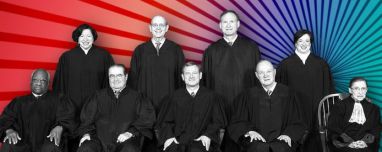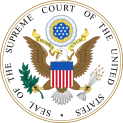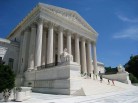SCOTUS Rules Obamacare Legal
KING v. BURWELL - U.S. Supreme Court No. 14–114
SUPREME COURT OF THE UNITED STATES
OCTOBER TERM, 2014 (Opinion PDF)
Cite as: 576 U. S. ____ (2015)
KING v. BURWELL, SECRETARY OF HEALTH AND HUMAN SERVICES. CERTIORARI TO THE UNITED STATES COURT OF APPEALS FOR THE FOURTH CIRCUIT,
759 F. 3d 358, affirmed
Argued March 4, 2015 — Decided June 25, 2015
759 F. 3d 358, affirmed
14-114_qol1.pdf
Adobe Acrobat document [211.9 KB]
KING v. BURWELL - SCOTUS blog No. 14–114
Legal Information Institute (LII) - Cornell U. Law School
King v. Burwell, 759 F. 3d 358, affirmed
Legal Information Institute (LII)
Cornell University Law School
Syllabus [HTML] [PDF]
Opinion, Roberts [HTML] [PDF]
Dissent, Scalia [HTML] [PDF]
King v. Burwell. Issues: Can the IRS give tax credits to participants of federally-run health insurance marketplaces established under the Affordable Care Act? Read more Cornell Law LII
Biographies of Current Justices of the Supreme Court
King v. Burwell, SCOTUS Rules Obamacare Legal
King v. Burwell
Wikipedia
King v. Burwell, 576 U.S. ___ (2015), was a decision by the Supreme Court of the United States interpreting provisions of the Patient Protection and Affordable Care Act (ACA). The Court's decision upheld, as consistent with the statute, the outlay of premium tax credits to qualifying persons in all states, both those with exchanges established directly by a state, and those otherwise established by the Department of Health and Human Services.
The petitioners had argued that the plain language of the statute provided eligibility for tax credits only to those persons in states with state-operated exchanges. The Court rejected this interpretation. Rather, the Court found the disputed clause to be ambiguous, and that it ought to be interpreted in a manner "that is compatible with the rest of the law." The majority opinion stated: "Congress made the guaranteed issue and community rating requirements applicable in every State in the Nation. But those requirements only work when combined with the coverage requirement and tax credits. So it stands to reason that Congress meant for those provisions to apply in every State as well."[1]
- King v. Burwell - Oyez
- King v. Burwell - Ballotpedia
Supreme Court Allows Nationwide Health Care Subsidies
The New York Times, By ADAM LIPTAK, June 25, 2015
Obamacare subsidies preserved in US Supreme Court ruling
BBC News, June 25, 2015
Supreme Court Rules Obamacare Subsidies Are Legal
Supreme Court Rules Obamacare Subsidies Are Legal
National Public Radio
By Krishnadev Calamur
June 25, 2015
The U.S. Supreme Court on Thursday handed the Obama administration a major victory on health care, ruling 6-3 that nationwide subsidies called for in the Affordable Care Act are legal.
"Congress passed the Affordable Care Act to improve health insurance markets, not to destroy them," the court's majority said in the opinion, which was written by Chief Justice John Roberts. But they acknowledged that "petitioners' arguments about the plain meaning ... are strong."
The majority opinion cited the law's "more than a few examples of inartful drafting," but added, "the context and structure of the Act compel us to depart from what would otherwise be the most natural reading of the pertinent statutory phrase."
Roberts was joined by the court's liberal justices, Ruth Bader Ginsburg, Stephen Breyer, Sonia Sotomayor and Elena Kagan, as well as by Anthony Kennedy.
In his dissent, Justice Antonin Scalia said: "We should start calling this law SCOTUScare," an apparent reference to the fact the Supreme Court has now saved the Affordable Care Act twice. Scalia called the majority's reading of the text "quite absurd, and the court's 21 pages of explanation make it no less so."
As NPR's Nina Totenberg reported in March, opponents of the law contended "that the text of the law does not authorize subsidies to make mandated insurance affordable in 34 states."
At issue were six words in one section of the law. As Nina pointed out: "Those words stipulate that for people who cannot afford health coverage, subsidies are available through 'an exchange established by the state.' " She added:
"The government [contended] that those words refer to any exchange, whether it is set up by the state itself or an exchange run for the state by the federal government in accordance with individual state insurance laws and regulations. The challengers [said] the statute means what it says and no more."
The court agreed Thursday with the government's position.
The decision comes three years after a bitterly divided high court upheld the Affordable Care Act as constitutional by a 5-4 vote.
President Obama made a statement on the ruling late Thursday morning, saying the Affordable Care Act "is here to stay."
Today's case was King v. Burwell.
Supreme Court to Hear Challenge to Health-Care Law
Supreme Court to Expedite Release of Audio for Health Care
Arguments
Blog of Legal Times
March 16, 2012
The Supreme Court just announced that it will provide same-day release of the audio of the historic oral arguments in the cases challenging the Affordable Care Act
beginning March 26.
Citing the "extraordinary public interest in those cases," the Court's announcement said that both the audio and an unofficial transcript of the arguments would be posted on the Court's Web site as soon as possible after they occur on each of
the three days of argument. That represents no change when it comes to the transcripts, which already are posted on the same day of the argument. But it does mean a new policy for the health care
cases when it comes to the audiotapes. Read more
Cast of Lawyers Arguing Supreme Court Health Care Cases Now Set
Blog of Legal Times
March 13, 2012
Solicitor General Donald Verrilli's swallowtail morning coat will get heavy use the week of March 26. The Justice Department has just confirmed that Verrilli will rise to
argue in three of the four separate and historic arguments on the constitutionality of the Affordable Care Act later this month. Those will be: the jurisdictional issue under the Anti-Injunction Act,
set for argument first, on March 26; the minimum coverage -- or individual mandate -- provision on March 27; and the Medicaid expansion question on March 28.
Veteran Deputy SG Edwin Kneedler, with more than 100 arguments under his belt, will take on the fourth issue, the severability question, also set for March 28. Verrilli's
heavy personal involvement in the arguments is just one more sign of the importance the Obama administration has attached to defending the embattled law.
Verrilli's adversary, Paul Clement of D.C.'s Bancroft firm, will rise to challenge the law in three of the four arguments -- all but the jurisdictional question, which
will be handled by Greg Katsas, a Jones Day partner. Katsas's colleague Michael Carvin will join Clement on the minimum coverage issue. Clement represents states challenging the law, while Carvin is
the point man for private entities. Two other lawyers -- Robert Long of Covington & Burling and H. Bartow Farr III of Farr & Taranto -- have been appointed by the Court to represent orphaned
arguments on the jurisdictional and severability issues, respectively.
All seven lawyers arguing in the cases are white males. By tradition, male lawyers -- and some female lawyers -- in the SG's office wear traditional morning coats for
Supreme Court arguments. We will be profiling the lawyers in advance of the arguments in our Supreme Court Insider newsletter.
Supreme Court to Hear Healthcare Arguments Over
Three-Day Period in March
Blog of Legal Times
December 19, 2011
Challenges to the nation’s new healthcare law will play out in the U.S. Supreme Court over three days in March.
The justices on Monday released the March argument calendar, which sets arguments on the Patient Protection and Affordable Care Act for three days on the final week of
March’s two-week argument session. The Court will hear only healthcare arguments on those three days.
The Court last month agreed to decide four questions about the controversial law. Here is how the justices have divided and scheduled those questions for
arguments:
March 26: whether the Anti-Injunction Act bars the suit challenging the law’s minimum coverage requirement (60 minutes, which may be expanded)
March 27: whether Congress had authority under Article I of the Constitution to enact the minimum coverage provision (2 hours)
March 28: whether the minimum coverage provision, if struck down, is severable from the law (90 minutes) and whether the health law’s expansion of Medicaid eligibility
exceeds Congress’ spending power (60 minutes)
The justices last month granted review in three petitions, all from the U.S. Court of Appeals for the 11th Circuit. That court was the only one of four reviewing the
statute to strike down the heart of the new law: the mandate that individuals who can afford health insurance must purchase coverage or pay a penalty.
The parties that are before the high court in the healthcare challenges are the United States, represented by Solicitor General Donald Verrilli Jr.; 26 state attorneys
general, represented by Paul Clement of Washington's Bancroft; and the National Federation of Independent Business (NFIB), represented by Michael Carvin of Jones Day.
In November, the justices also appointed as amicus H. Bartow Farr III of D.C.’s Farr & Taranto to defend the 11th Circuit’s ruling that the law’s minimum insurance
coverage requirement—the so-called individual mandate—is severable from the rest of the law. And Covington & Burling’s Robert Long was asked to make the argument—abandoned by the United
States—that the Anti-Injunction Act bars the state attorneys general’s challenge to the mandate. Read more
Supreme Court to Hear Challenge to Health-Care Law;
Case Arrives ‘On a Winning Streak’ for US
ABA Journal Law New Now
by Debra Cassens Weiss
November 14, 2011
The court granted cert today in three cases and allowed extra oral argument time when the case is heard in March, SCOTUSblog reports. As a result of the schedule, the case will be decided only months before the
presidential elections, USA Today reports. The
court gave the parties a total of 5 1/2 hours to argue the cases, apparently setting a modern record, SCOTUSblog says.
According to the Los Angeles Times, the law has arrived at
the court "riding a surprising winning streak and carrying a constitutional stamp of approval from prominent conservative judges."
Only three out of 12 federal appeals judges who considered the law voted to overturn it. The rulings provide arguments for upholding the law that could appeal even to
some conservatives on the court, the newspaper says.
The major issue: whether Congress can require individuals to buy health insurance or pay a penalty. Two leading conservative judges—Jeffrey Sutton of the 6th U.S. Circuit
Court of Appeals and Laurence Silberman of the U.S. Court of Appeals for the District of Columbia Circuit—wrote opinions upholding the law.
Both relied on a 2005 Supreme Court opinion, Gonzales v. Raich, upholding the federal government’s authority to regulate pot. The court held in Raich that the federal
government had commerce clause authority to ban medical marijuana, even when the drug doesn’t cross state lines.
Four federal appeals courts have considered the health-care law. Two upheld it, one struck it down, and one found the state of Virginia had no standing to challenge
it.
The New York Times also has a
story on the pending constitutional questions. Read more
Romneycare vs Obamacare, The Boston Globe, June 28, 2011
U.S. 11th Circuit: Individual Mandate is Unconstitutional
Eleventh Circuit Rules Individual Mandate is
Unconstitutional
The BLT: The Blog of Legal Times
August 12, 2011
Setting up a circuit conflict over the most controversial part of the health care reform law, a divided panel of the U.S. Court of Appeals for the 11th Circuit has just
ruled that the "individual mandate" feature exceeds the authority of Congress to legislate under the Constitution.
"This economic mandate represents a wholly novel and potentially unbounded assertion of congressional authority: the ability to compel Americans to purchase an expensive
health insurance product they have elected not to buy, and to make them re-purchase that insurance product every month for their entire lives," the ruling states.
That judgment runs counter the decision in late June by the U.S. Court of Appeals for the 6th Circuit that upheld the mandate as a justifiable exercise of congressional
Commerce Clause power. The mandate requires most individuals to obtain at least a minimum of insurance coverage, as a way of spreading health care costs to a larger pool of individuals.
The likelihood that the Supreme Court would ultimately decide the issue was never in much doubt, but today's decision makes that prospect even more certain, because the
most common justification for Supreme Court review is now met: a conflict between two circuits. It also makes it more likely that the battle will be joined at the high court in the coming term,
before next year's presidential election. Read
more
The Constitutionality of the Individual Mandate
The New England Journal of Medicine
Since the Affordable Care Act was passed, numerous lawsuits have been filed arguing that the federal mandate that individuals obtain health insurance is unconstitutional.
Three appeals courts have issued mixed rulings, and the matter will probably ultimately be decided by the Supreme Court. In this video roundtable, Wendy Mariner moderates a discussion between legal
scholars Jack Balkin and Ilya Somin focusing on the relevant constitutional issues. Read more
The New England Journal of Medicine, Transcript
The Constitutionality of the Individual [...]
Adobe Acrobat document [50.8 KB]














































































































































